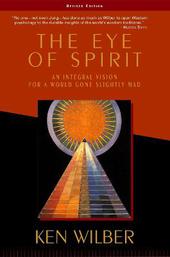
|
The Eye of Spirit: An Integral Vision for a World Gone Slightly Mad
Paperback / softback
Main Details
| Title |
The Eye of Spirit: An Integral Vision for a World Gone Slightly Mad
|
| Authors and Contributors |
By (author) Ken Wilber
|
| Physical Properties |
| Format:Paperback / softback | | Pages:464 | | Dimensions(mm): Height 229,Width 153 |
|
| Category/Genre | Popular psychology
Mind, Body, Spirit - thought and practice |
|---|
| ISBN/Barcode |
9781570628719
|
| Classifications | Dewey:155.2 |
|---|
| Audience | |
|---|
|
Publishing Details |
| Publisher |
Shambhala Publications Inc
|
| Imprint |
Shambhala Publications Inc
|
| Publication Date |
11 December 2001 |
| Publication Country |
United States
|
Description
One of the most influential American philosophers of our time presents his vision for a fully integrated world-a world that includes body, mind, soul, and spirit In this groundbreaking book, Ken Wilber uses his widely acknowledged "spectrum of consciousness" model to completely rewrite our approach to such important fields as psychology, spirituality, anthropology, cultural studies, art and literary theory, ecology, feminism, and planetary transformation. What would each of those fields look like if we wholeheartedly accepted the existence of not just body and mind but also soul and spirit? In a stunning display of integrative embrace, Wilber weaves these various fragments together into a coherent and compelling vision for the modern and postmodern world.
Author Biography
Ken Wilber is the author of over twenty books. He is the founder of Integral Institute, a think-tank for studying integral theory and practice, with outreach through local and online communities such as Integral Education Network, Integral Training, and Integral Spiritual Center.
Reviews"This intellectually demanding yet engagingly written collection of essays explores a number of timely and important issues, such as the relationship between psychological and spiritual growth and the political implications of where we locate Spirit (God? Gaia?). Along the way, the author revisits his earlier books, revealing how his thought has developed and, in the process, introducing his central ideas to the first time reader."-Keith Thompson, San Francisco Chronicle
|